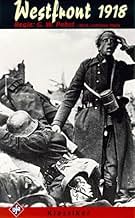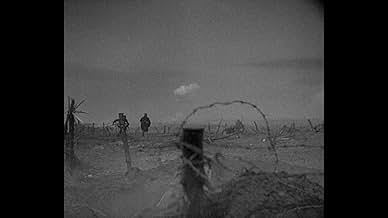CALIFICACIÓN DE IMDb
7.3/10
2.6 k
TU CALIFICACIÓN
Agrega una trama en tu idiomaA group of German solders fight on the front line in France at the end of World War I.A group of German solders fight on the front line in France at the end of World War I.A group of German solders fight on the front line in France at the end of World War I.
- Dirección
- Guionistas
- Elenco
- Premios
- 1 premio ganado en total
Hans-Joachim Möbis
- Der Student
- (as H.J. Moebis)
Aribert Mog
- Undetermined Secdondary Role
- (sin créditos)
Gustav Püttjer
- Hamburger
- (sin créditos)
André Saint-Germain
- Undetermined Secondary Role
- (sin créditos)
Vladimir Sokoloff
- Meal Orderly
- (sin créditos)
Ilse Trautschold
- Undetermined Secondary Role
- (sin créditos)
Emil Wabschke
- Undetermined Secondary Role
- (sin créditos)
- Dirección
- Guionistas
- Todo el elenco y el equipo
- Producción, taquilla y más en IMDbPro
Opiniones destacadas
This movie has an awful lot in common with another film that also debuted in 1930. Both this film and ALL QUIET ON THE WESTERN FRONT are terrific World War I films that give an awful and realistic view of the war from the perspectives of ordinary German soldiers. As a result, both are also profoundly anti-war films that were later banned by the Nazi government that took power just a few years later. Of the two, ALL QUIET ON THE WESTERN FRONT is a slightly better film because it has an excellent back story (in other words, setting up the characters and giving them some depth). Instead, WESTFRONT 1918 is more like a hidden camera that just shows parts of the war--only towards the very end of WWI. Also, unlike ALL QUIET, this film only once follows one soldier home and shows life outside the battlefield. Mostly, the film is just one battle scene after another after another. Despite seeming a tiny bit out of context because of this, it is still a super effective and moving piece of film. A truly well-made and exceptional film with ultra-gritty realism. It is occasionally tough to watch, as there are corpses everywhere and the action is often up close and very personal.
As I said, this film isn't quite as perfect and profound as ALL QUIET ON THE WESTERN FRONT, though it actually is better than the exceptional French film, J'Accuse or THE EAGLE AND THE HAWK--two other terrific WWI films that emphasize the futility and waste of this stupid war.
As I said, this film isn't quite as perfect and profound as ALL QUIET ON THE WESTERN FRONT, though it actually is better than the exceptional French film, J'Accuse or THE EAGLE AND THE HAWK--two other terrific WWI films that emphasize the futility and waste of this stupid war.
Very much worth viewing. I caught it on Turner Classic Movies recently, and was very pleasantly surprised by the quality of this film.
This film transcends the limitations of the sensibilities of the time and the special effects available to movie makers. It makes no sweeping statements or judgments about war and aggression. It simply gives you a glimpse of what it was like to live and die in the trenches of The Great War.
Although not as intense as "All Quiet on the Western Front" (whose subject matter it shares), it has its moments of artistry. It is also more narrowly focused than "All Quiet..", but its story is compelling and riveting. Should be in anybody's serious list of worthy war movies.
This film transcends the limitations of the sensibilities of the time and the special effects available to movie makers. It makes no sweeping statements or judgments about war and aggression. It simply gives you a glimpse of what it was like to live and die in the trenches of The Great War.
Although not as intense as "All Quiet on the Western Front" (whose subject matter it shares), it has its moments of artistry. It is also more narrowly focused than "All Quiet..", but its story is compelling and riveting. Should be in anybody's serious list of worthy war movies.
In this German WW1 movie from director G. W. Pabst, the film follows a small group of German infantrymen during the waning days of the war. The "Student" (Hans-Joachim Moebis), a young eager soldier, volunteers for dangerous messenger duty in order to grab time with a nearby village girl (Jackie Monnier). Karl (Gustav Diessl) pines for his wife back home, but a trip back during leave doesn't bring the desired results. And all around them rains death and destruction. Also featuring Claus Clausen.
This makes for an interesting companion piece to this same year's All Quiet on the Western Front. This movie is a bit rawer, with some minor fondling and cursing that wouldn't have made it into a US film, even during the pre-code era. The performances are all good, and I especially liked the turn by Clausen as an intense lieutenant in over his head. There's a section in a beerhall with a USO-type show featuring musicians, a raunchy singer, and a clown, that goes on a bit too long. The last 15 minutes or so are some of the most devastating war scenes in film. Highly recommended. .
This makes for an interesting companion piece to this same year's All Quiet on the Western Front. This movie is a bit rawer, with some minor fondling and cursing that wouldn't have made it into a US film, even during the pre-code era. The performances are all good, and I especially liked the turn by Clausen as an intense lieutenant in over his head. There's a section in a beerhall with a USO-type show featuring musicians, a raunchy singer, and a clown, that goes on a bit too long. The last 15 minutes or so are some of the most devastating war scenes in film. Highly recommended. .
Director G.W. Pabst uses sound well in this, his first sound film. There's the noise of continual bombardment, which adds to the visual realism. Moreover, sound serves continuity. Whistling continues from one scene to another in one transition; in another, the music of a band playing at a canteen turns into the drumbeat for marching soldiers. Also endearing of this antiwar statement is that it is not exciting, unlike other supposedly dovish pictures that end up romanticizing battle. There's the screaming Frenchman between trenches. An artillery firing line is too short, hitting patriot trenches. A return home on leave has a soldier discovering that his wife trades sex to get by.
The framing, editing and visual quality are adept, as one would expect from Pabst, if not from an early sound film. I especially liked the framing and fluidity of the staircase goodbye. There's a surveying moving camera, as there is in "All Quiet on the Western Front". The long battle sequence at the end is the climax of the salient film-making. There is a very long take from an unmoving position, as if the camera were a hidden soldier observing; it is unexciting, yet my attention was not discouraged.
The framing, editing and visual quality are adept, as one would expect from Pabst, if not from an early sound film. I especially liked the framing and fluidity of the staircase goodbye. There's a surveying moving camera, as there is in "All Quiet on the Western Front". The long battle sequence at the end is the climax of the salient film-making. There is a very long take from an unmoving position, as if the camera were a hidden soldier observing; it is unexciting, yet my attention was not discouraged.
Although this covers the same broad subject matter as "All Quiet", there is a different and welcome perspective and the film making is very definitely more European in style, harder edged and more matter of fact, which I have to say I prefer. For the English speaking audience it does suffer in that it has not been cared for and restored in the same way as "All Quiet". The version I saw had some rather jarring (at least to my English ears) subtitles, which showed that the UK and the USA are indeed two countries divided by a common language. I'm not sure what German words translate as "What in tarnation". Having said that the film was powerful, innovative and quite startling in its use of sound, which we should bear in mind had only been in use for 3 years or so. If someone knows where there is a restored version for the English speaking audience (preferably on DVD) I will be first in the queue
¿Sabías que…?
- TriviaThis film was banned by the Nazis after they came into power in Germany in 1933.
- ErroresThe depth of the trenches is inaccurate. In several scenes where the soldiers are standing up, their heads are higher than the top of the trench, making them easy targets for snipers and also allowing the French to monitor troop movements.
- Citas
Woman in rationed food line: What are you doing? Back of the line!
Another Woman in rationed food line: What's wrong with the old cow? Cutting in line!
Man in rationed food line: Leave the woman alone.
Woman cutting in rationed food line: My Adolf is dead.
Woman in rationed food line: Think you're the only one? That's no reason to cut in line. Go to the back!
- ConexionesEdited into A Hellish Chaos (2017)
Selecciones populares
Inicia sesión para calificar y agrega a la lista de videos para obtener recomendaciones personalizadas
- How long is Westfront 1918?Con tecnología de Alexa
Detalles
- Fecha de lanzamiento
- País de origen
- Idiomas
- También se conoce como
- Westfront 1918
- Locaciones de filmación
- Productoras
- Ver más créditos de la compañía en IMDbPro
- Tiempo de ejecución1 hora 15 minutos
- Color
- Relación de aspecto
- 1.20 : 1
Contribuir a esta página
Sugiere una edición o agrega el contenido que falta


























